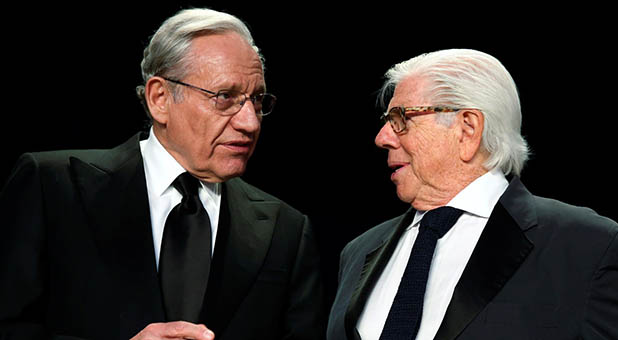Woodward and Bernstein Weigh In on the Firing of James Comey
No two names are more synonymous with bringing down an American presidency than Woodward and Bernstein.
Bob Woodward and Carl Bernstein, young reporters for The Washington Post—with help from the informant code-named “Deep Throat” and using controversial tactics—did much of the reporting on the Watergate scandal that eventually forced President Richard Nixon to resign. They became the first real media heroes and continue to inspire generations of overeager investigative journalists to this day.
In fact, while many of them may not admit it, almost every reporter in Washington, D.C., hopes to get a scoop as big as Woodward and Bernstein’s. And if you were to listen to most of them, they seem to think they’ll find it—if they dig deep enough—in the administration of President Donald Trump.
But after the president’s firing of former FBI Director James Comey, and congressional Democrats’ demand that it lead to is impeachment, the two investigative journalists have given entirely different views on what is happening.
First, Bernstein, who was a guest Sunday on CNN’s “Reliable Sources” program:
We are hearing from conservative and Republican commentators in the press: Jonah Goldberg, Charles Krauthammer, and others, questioning the very stability of the president of the United States. This is unheard of, and that is an element of this, because Republicans on Capitol Hill, the Republicans during Watergate were heroic. They are the ones who said, ‘What did the president know and when did he know it?’ They investigated and investigated and voted for his impeachment because they were willing to see the truth served.
We have not seen something similar from Republicans thus far. Maybe we will. But what we are hearing in private from many people on Capitol Hill—congressmen, senators—they doubt the stability, honesty and fitness for office of this president of the United States. That has become part of the story for the press. …
Richard Nixon was a criminal president. Donald Trump is a president with whom there is a grave question about his fitness and ability to conduct the office of the presidency. That’s going hand in hand with the possible coverup into collusion with a foreign power. Hopefully, there will be no evidence of collusion.
And, then, Woodward, who spoke with Chris Wallace on his “FOX News Sunday”:
Well, there are a lot of questions. I was fascinated with what Sen. Warner had to say. I think he adopted this position of ‘We’re going to give the president the benefit of the doubt.’ But he then raised about 10 questions, which I think need to be answered. But this is not yet Watergate. Not a clear crime on the Russian issue. Senator Warner and others have said there are—there are—you know, a thousand questions and they should be answered. But there’s no evidence that President Trump, at this point, was somehow involved in collusion here. …
[H]is actions are strange and unpredictable and impulsive as always. But in the case of Nixon, he had his former White House counsel, John Dean, for four days testifying that the president corruptly and illegally led the obstruction of justice and you have nothing comparable. Now, that doesn’t mean, you know, we don’t know where this is going to go. There is an immense amount of smoke.
The other problem here is Sen. Warner was saying, if there are tapes, he would like to get the tapes, the Senate get the tapes. In the case of Nixon back in 1974, the Supreme Court ruled that a special prosecutor or a prosecutor can get tapes if there—if it’s demonstrated that they’re admissible and relevant, but not a Senate committee. So they’re—we’re—you know, and—and the white House posture on this, we’re not answering. Did he tape? Trump has a history of this. I think one of the lessons of Watergate is, don’t tape. …
[T]he great question in Washington, the country, and the world is, what’s inside of Trump. What’s driving him? As we look at that Comey firing, it was Karl Rove’s declaration to me many years ago, you always have to look at consequence and outcome. And the consequence and outcome of the Comey firing, some people are saying, oh, it’s part of the obstruction of justice. It actually may be the opposite, the acceleration of justice. Now people are not going to back off on this. So the inside of Trump is one of the mysteries that just doesn’t go away …
[L]ook at the campaign. There were these emotional outbursts all the time. That’s the way he operates. The—the question here really is, as we look back on this week from historical perspective, the big issue may not be the Comey firing, it may be the massive cyberattack worldwide that really jeopardizes every communication that anyone engages in. At the second issue, the North Korean missile firing, you see the trajectory on that? Landed 60 miles off the coast of Russia. Can you imagine in this country if a North Korean missile landed 60 miles away from Los Angeles? Those are giant issues. So, you know, taking the—the—doing the psychiatric examination of the president is something we are certainly immensely unqualified to do.
















































